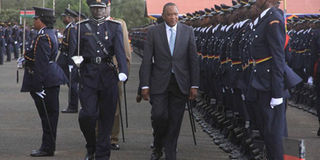Streamline the mess that is VIP protection

President Uhuru Kenyatta inspects a guard of honour during a pass-out ceremony of 2,209 police recruits at Police Training College Kiganjo in Nyeri County on April 4, 2014. Kenya’s security priorities appear wanting after the disclosure that over 10 per cent of the country’s policemen are deployed to protect VIPs. FILE PHOTO |
What you need to know:
- Most VIPs demand bodyguards, not because they are under threat but simply to show that they are of a special social status.
- Many countries have liberalised VIP protection. Private security firms are allowed to undertake the mandate of VIP protection through well-articulated policies and guidelines from the government.
- Kenya, with its well educated population and high rate of unemployment, needs to explore many untapped opportunities of privatising VIP protection.
- We should move away from the traditional concept of looking at VIP protection in terms of senior government officials only.
- The country’s police-citizen ratio is low, therefore the government has the responsibility of evaluating the deployment of bodyguards to VIPs.
Kenya’s security priorities appear wanting after the disclosure that over 10 per cent of the country’s policemen are deployed to protect VIPs.
VIP protection in this country is not driven by security risk assessment but inherited tradition.
It is now common to see chase cars in the counties where governors and MCAs enjoy the status of mini-presidents.
In Nairobi, VIPs have become a nuisance as it is common for county- and government-registered heavy cars to drive on the wrong side of the road, inconveniencing other motorists.
Most VIPs demand bodyguards, not because they are under threat but simply to show that they are of a special social status.
Many countries have liberalised VIP protection. Private security firms are allowed to undertake the mandate of VIP protection through well-articulated policies and guidelines from the government.
In Romania, the government has outsourced the VIP protection mandate to selected security firms that train personnel in VIP protection.
Embassies, government buildings, critical infrastructure, and foreign dignitaries are guarded by private security agencies.
The trained personnel are allowed to carry firearms that are registered with the police department.
The police carry out ad hoc inspection to ensure that the firms adhere to the strict policies and procedures.
This system allows the regular police to concentrate on their primary mandate of maintaining law and order.
LIBERALISING VIP PROTECTION
In Kenya, we have many opportunities of liberalising VIP protection and the security of critical installations.
Many multi-national corporations operating in East and Central Africa hire foreign protection units mainly from Britain, Israel, and South Africa to guard their VIPs.
In Somalia, the Democratic Republic of the Congo, and Mozambique, these corporations employ private VIP protection units from Europe and South Africa.
Kenya can adopt this example to protect its VIPs and critical installations. This will create employment, earn the country foreign currency, and provide local services.
Kenya, with its well educated population and high rate of unemployment, needs to explore many untapped opportunities of privatising VIP protection.
We should move away from the traditional concept of looking at VIP protection in terms of senior government officials only.
VIPs should include important persons in the commercial sector, scientists, athletes (we have numerous world champions), and high profile influential persons.
In developed countries, it is difficult to distinguish between a VIP and the common citizen because hardly would you see escorts or chase cars. Even if a VIP is allocated bodyguards, they operate undercover.
Most of our VIP bodyguards operate like bouncers, not well-trained VIP protection personnel.
Untrained bodyguards are a risk to themselves and the people they guard. They are easily identified and can easily be compromised.
The country’s police-citizen ratio is low, therefore the government has the responsibility of evaluating the deployment of bodyguards to VIPs.
The threat assessment should not be status - or politically-driven but threat-driven.
For instance, one would expect the governor of Turkana or Mandera to have more and better-trained bodyguards than a governor in Nakuru or Kitui.
VIP PROTECTION UNIT
We may need a completely new VIP protection unit that operates free of political manipulation and reports directly to the Inspector General of Police, similar to the Secret Service in the US and that one of Israel.
The unit should do its independent threat assessment for proper allocation of personnel. When the threat levels recede, the allocation should shrink.
If the threat level increases, the allocation should be increased.
We need a strict policy of who qualifies for VIP protection. There must be strict operating procedures for bodyguards to protect them from being misused.
If this is adhered to, the haphazard allocation of bodyguards to VIPs will be a thing of the past.
Mr Mbarak is a retired military officer and security management consultant. [email protected]





